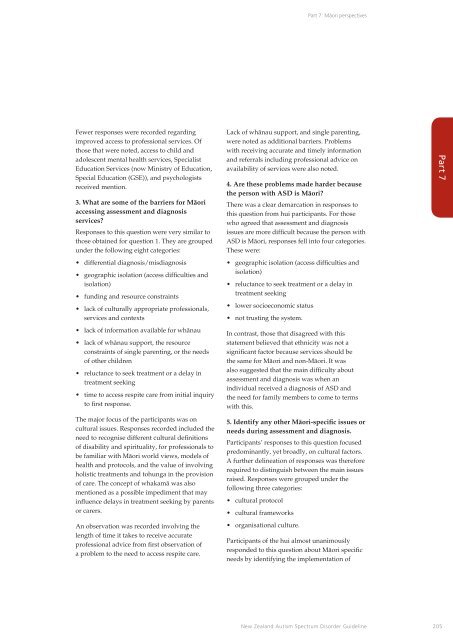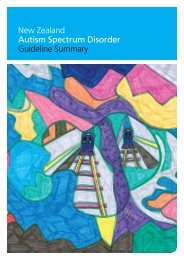New Zealand Autism Spectrum Disorder Guideline - Ministry of Health
New Zealand Autism Spectrum Disorder Guideline - Ministry of Health
New Zealand Autism Spectrum Disorder Guideline - Ministry of Health
You also want an ePaper? Increase the reach of your titles
YUMPU automatically turns print PDFs into web optimized ePapers that Google loves.
Part 7: Mäori perspectives<br />
Fewer responses were recorded regarding<br />
improved access to pr<strong>of</strong>essional services. Of<br />
those that were noted, access to child and<br />
adolescent mental health services, Specialist<br />
Education Services (now <strong>Ministry</strong> <strong>of</strong> Education,<br />
Special Education (GSE)), and psychologists<br />
received mention.<br />
3. What are some <strong>of</strong> the barriers for Mäori<br />
accessing assessment and diagnosis<br />
services?<br />
Responses to this question were very similar to<br />
those obtained for question 1. They are grouped<br />
under the following eight categories:<br />
• differential diagnosis/misdiagnosis<br />
• geographic isolation (access difficulties and<br />
isolation)<br />
• funding and resource constraints<br />
• lack <strong>of</strong> culturally appropriate pr<strong>of</strong>essionals,<br />
services and contexts<br />
• lack <strong>of</strong> information available for whänau<br />
• lack <strong>of</strong> whänau support, the resource<br />
constraints <strong>of</strong> single parenting, or the needs<br />
<strong>of</strong> other children<br />
• reluctance to seek treatment or a delay in<br />
treatment seeking<br />
• time to access respite care from initial inquiry<br />
to first response.<br />
Lack <strong>of</strong> whänau support, and single parenting,<br />
were noted as additional barriers. Problems<br />
with receiving accurate and timely information<br />
and referrals including pr<strong>of</strong>essional advice on<br />
availability <strong>of</strong> services were also noted.<br />
4. Are these problems made harder because<br />
the person with ASD is Mäori?<br />
There was a clear demarcation in responses to<br />
this question from hui participants. For those<br />
who agreed that assessment and diagnosis<br />
issues are more difficult because the person with<br />
ASD is Mäori, responses fell into four categories.<br />
These were:<br />
• geographic isolation (access difficulties and<br />
isolation)<br />
• reluctance to seek treatment or a delay in<br />
treatment seeking<br />
• lower socioeconomic status<br />
• not trusting the system.<br />
In contrast, those that disagreed with this<br />
statement believed that ethnicity was not a<br />
significant factor because services should be<br />
the same for Mäori and non-Mäori. It was<br />
also suggested that the main difficulty about<br />
assessment and diagnosis was when an<br />
individual received a diagnosis <strong>of</strong> ASD and<br />
the need for family members to come to terms<br />
with this.<br />
Part 7<br />
The major focus <strong>of</strong> the participants was on<br />
cultural issues. Responses recorded included the<br />
need to recognise different cultural definitions<br />
<strong>of</strong> disability and spirituality, for pr<strong>of</strong>essionals to<br />
be familiar with Mäori world views, models <strong>of</strong><br />
health and protocols, and the value <strong>of</strong> involving<br />
holistic treatments and tohunga in the provision<br />
<strong>of</strong> care. The concept <strong>of</strong> whakamä was also<br />
mentioned as a possible impediment that may<br />
influence delays in treatment seeking by parents<br />
or carers.<br />
An observation was recorded involving the<br />
length <strong>of</strong> time it takes to receive accurate<br />
pr<strong>of</strong>essional advice from first observation <strong>of</strong><br />
a problem to the need to access respite care.<br />
5. Identify any other Mäori-specific issues or<br />
needs during assessment and diagnosis.<br />
Participants’ responses to this question focused<br />
predominantly, yet broadly, on cultural factors.<br />
A further delineation <strong>of</strong> responses was therefore<br />
required to distinguish between the main issues<br />
raised. Responses were grouped under the<br />
following three categories:<br />
• cultural protocol<br />
• cultural frameworks<br />
• organisational culture.<br />
Participants <strong>of</strong> the hui almost unanimously<br />
responded to this question about Mäori specific<br />
needs by identifying the implementation <strong>of</strong><br />
<strong>New</strong> <strong>Zealand</strong> <strong>Autism</strong> <strong>Spectrum</strong> <strong>Disorder</strong> <strong>Guideline</strong> 205











